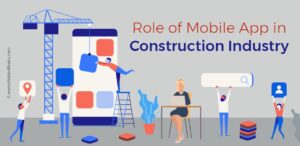The field of mobile app development is particularly attractive based on several devices a developer can build apps for. In the future, app developers expect there will be a rapid proliferation of connected devices other than tablets and smartphones, encompassing televisions, connected cars, gaming consoles, and VR devices. Undoubtedly, this is a market that is constantly expanding and evolving.
The construction industry is constantly growing at a rapid pace, but the one thing that remains the same is that construction projects require a serious amount of coordination of people and resources in the field. Role of Mobile Apps in Construction Industry are making its presence felt in the construction industry, allowing keeping a track of team, milestones, schedules, equipment, inventory and more. The conventional form involved managing information in books, spreadsheets or mailing to someone.
This affected productivity and increased burden on resources to maintain information. Fast forward to the present scene, construction professionals have smartphone applications or tablets. There is immense opportunity to improve efficiency, reduce costs and speed up project timelines with mobile solutions.
In order to leverage the latest technology it is important to partner with a leading mobile application development company.
Mobile Technology
Smartphone applications have taken communication between different teams or stakeholders of projects easier. Technology can facilitate meetings of staff across different locations without interrupting the day’s work helping to reach definitive conclusions. Being able to communicate in real time ensures that several routine issues are resolved quickly and effectively. Real-time solutions allow different stakeholders to add notes, change drawings and respond to emergency situations and share that information with everyone involved with the project at the same time.
Here are different ways that help mobile apps create a lasting impact in the construction industry.
- Site inspections
- Safety incident reporting
- Punch lists
- Timesheets and materials tracking
Minimize delays in the process
It is essential to track information related to different aspects of the construction process such as progress, deficiencies or incidents to minimize project delays. Once this information is gathered in mobile forms and submitted for everyone to access, this critical information helps to shed light on issues that might put projects on hold and keep construction on schedule.
Seamless communication with stakeholders
One of the role of Mobile Apps in Construction Industry is facilitate information exchange of daily reports at the job with different stakeholders. This allows ease of communication between project stakeholders. Access to information among different stakeholders at the same time reduces errors. Daily exchange of information also highlights problem areas requiring attention.
Increased efficiency & Focus on Core Tasks
By modernizing information sharing, construction companies save hundreds of hours and resources spent on data entry, deciphering information for reporting, or maintaining paperwork that has been lost or filed. Sophisticated BI dashboards can quickly visualize and act on important information for the day. Increasing back-office efficiency allows focus on core activities and completing construction projects on time and on budget.
Improve accountability of field staff
Effective monitoring of field staff spent on-site is another advantage of mobile applications. This improves accountability and reduces labor costs. Costs can be reduced with mobile timesheets to record clock-in/clock-out times to the minute.
Construction staff can document work progress with photos in mobile forms for transparency to management and clients.
Equipment Management
Equipment scheduling and maintenance plays a critical role in determining the bottom line of a construction company. With a mobile solution, tracking and managing log equipment use and hours becomes a relatively easy task, improving planning and use.
Contract Management
These tools help staff with many critical tasks such as updating contract-compliance checklists or collecting information about client and contractor communications that occur when contract terms are renegotiated.
Performance Management
Applications help to instantly update and share critical information about workforce across the preconstruction and construction phases. Some performance dashboards can import field data and ease out the process of collecting information.
Document Management
Effective document management applications can help with uploading documents, tracking changes and keeping track of all decisions, as well as provides easy access to past records.
Using mobile apps to gather information at the job site improves accuracy and minimizes issues from manual writing such as illegible handwriting, unpredictable data, and information gaps. Photos, GPS, time stamps and invoices captured on-site provide an accurate and indisputable audit trail for the project, delivering the much needed accountability to clients or serve as evidence in legal matters.
Safety Tracking
Safety of on-site tools comes across as a major challenge for E&C companies. Many apps allow the reporting of safety incidents across sites as well as provide crucial safety alerts to entire workforce.
Quality Control
Technology solutions mainly applications help inspection of sites which might be remote or distant by providing pictures and image tags. The proliferation of technology such as GPS in has already increased the accuracy of project specifications, streamline process for accurate on-site execution. Several emerging technologies such as artificial intelligence combined with mobile technology can help build quality-control systems. Start-ups have developed products to assist with many other on-site activities, including supply-chain logistics.
Conclusion
Mobile app development allows real-time updates such as collecting information from an office and sharing the information with relevant stakeholders in different locations, anytime, anywhere. This technology is used to measure and track daily activities as well as important information and streamline collaboration between teams in the field and at the office. Are you ready for change?































































































![Sales & Distribution [Oil & Gas] Sales & Distribution [Oil & Gas]](https://www.hiddenbrains.com/blog/wp-content/themes/blankslate/assets/images/sales_and_distribution-icon.74d08193.svg)

![Fluid Terminal Management [Oil & Gas] Fluid Terminal Management [Oil & Gas]](https://www.hiddenbrains.com/blog/wp-content/themes/blankslate/assets/images/fluid_terminal_management-icon.4b3a27a4.svg)































![Sales & Distribution [Oil & Gas] Sales & Distribution [Oil & Gas]](https://www.hiddenbrains.com/blog/wp-content/themes/blankslate/assets/images/sales_and_distribution-icon.74d08193.svg?1.0.0)
![Fluid Terminal Management [Oil & Gas] Fluid Terminal Management [Oil & Gas]](https://www.hiddenbrains.com/blog/wp-content/themes/blankslate/assets/images/fluid_terminal_management-icon.4b3a27a4.svg?1.0.0)
























































































































































































